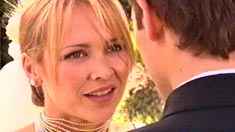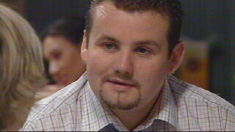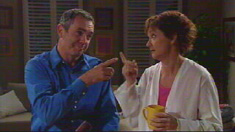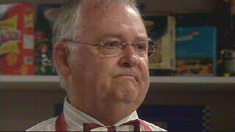|
.
Interviews
> Peter Mattessi
Peter
Mattessi has worked as a Neighbours scriptwriter since
2003 and currently holds the position of script editor on
the show. Here, he chats to Perfect Blend about his career,
his favourite aspects of the programme and why he thinks Harold
Bishop is a superhero...
Can
you give us a background on your career and involvement in
the television industry prior to Neighbours?
Ah, that's an interesting one. The short answer is that I
didn't really have an involvement in the television industry
prior to Neighbours. I went pretty much straight from
university (I did a Bachelor of Arts in Cinema Studies) to
working on the show. Before I started, I had done a bit of
TV criticism for the Green Guide, which is the long-running
weekly television supplement in Melbourne's The Age newspaper
(www.theage.com.au).
I had also contributed the occasional academic piece to Metro Magazine, a semi-academic
media- related publication in Melbourne, and given the odd
paper here and there on Buffy, which was what I was
studying at the time. But as for television, it was completely
new to me.
How did you come to work on Neighbours?
When I started on the show in 2003, Grundy ran a formal trainee
program for potential storyliners. Neighbours took
on eight trainee storyliners a year for a six week stint each.
This was advertised nationally in all major newspapers and
I applied with a CV and a couple of pages of a script that
I had written. Something about my application must have caught
the eye of Ben (Michael - Script Producer), Luke (Devenish
- Script Producer) and Ric (Pellizzeri - Grundy Head of Drama),
because they called me in for an interview where I had to
pitch to them a story for the show. I remember the interview
being far more relaxed than any I had done before: Ben was
in shorts and had his feet on the table, and I think someone
said "shit" in the first couple of minutes - it
was very different to the interviews I'd done with law firms.
I remember that they liked my story about Boyd being inadvertantly
swept up in a crime ring, as well as the script I had submitted.
I remember Luke telling me that he could imagine the Scullys
saying it, which at the time I was a little put out by, but
I have since come to realise that, from Luke, that is high
praise indeed. I was offered a position as a trainee storyliner,
and so began my life on Ramsay Street.
 Were
you a fan of the series before joining the crew? Were
you a fan of the series before joining the crew?
I was. Like every Australian (and British) youth, I had grown
up with the show, dipping in an out for probably twenty years.
But it was when I was at university that I really got stuck
into it. I recall that the Flick/Steph/Marc love triangle
had my household gripped for weeks. And when it finally came
to a head we screamed on the couch together. Now, I can talk
about the show ad nauseum, an affliction that strikes pretty
much everyone who works on it.
Can
you explain to us your various roles in the production of
the Neighbours saga through the years, and what they’ve
entailed?
At the beginning, I was a trainee storyliner.
I sat in the story room with Ben and the other storyliners
(who were, at the time, Lara Radulovich, Kim Wilson, Piet
Collins, Elizabeth Packett and Martin McKenna). For the first
couple of weeks I just watched, listened, tried to contribute.
As I became more confident, I was assigned first a segment,
then an episode to storyline. After my six weeks, Luke and
Ben asked me if I would like to come back for a twelve week
stint as a proper, grown up storyliner. Would I what!
Unfortunately,
Delta Goodrem was struck with cancer during my stint as a
storyliner, terrible not only for Delta and her family, but
also for the story team. All of a sudden, the show was faced
with losing an actor that features in about eight weeks of
story already plotted, and much more beyond that. The process
of taking Nina out of scripts, plausibly covering her absence,
and finding something for the other characters to do is a
nightmare, and something that no script producer ever wants
to deal with. For me, it meant that my inexperience was not
something that the team could afford to bear in such a high-pressure
situation. And so Luke moved me from an in-house
role as a storyliner to a freelance writer. I had written
a script submission and that was enough to earn me a trial
script. When that went well, I continued writing scripts for
the show for about two years.
Now,
I am in-house again as a script editor. Each fortnight I receive
five first-draft scripts from the writers (the scripts that
I used to submit myself) and I spend a week or so making sure
that they are in tip-top shape. That the stories flow, that
there are no continuity glitches, that the characters' voices
are right, that the balance of stories in an episode/week
is the best it could be, that each scene sells its purpose
as best it can, and many other tasks. When I'm not editing,
I'm amending scripts for production changes, writing filler
scenes if an episode has come in short, and participating
in story conferences. To be honest, I've never been so busy
in my life.
How
does a typical writing assignment on Neighbours work?
As a writer, you receive a copy of the Scene Breakdown each
week. This is essentially a scene-by-scene description of
an entire week of episodes. Once in a while, you will be assigned
to write one of those episodes. I pretty much just sit down
with my ep and read it a few times, scribbling little ideas
for lines in the margins, then set about writing it. I often
write my first sketches in longhand, just because I find it
easier to think that way. But I do this less and less, because
I found I was writing something then just typing into the
computer. As a writer your job is to make each moment in the
script as strong as you can - the storyliners churn out dozens
of scenes a week, but with two weeks to write one episode,
the writer can afford to spend a lot of time shaping each
scene for maximum impact. The ideal script goes back to the
editor with all the magic ingredients: drama, romance, comedy.
That's what I aim for.

Who
have been your favourite characters to write for?
Ah!
It's like choosing which of my children I love the most! If
I had to, I would say Toadie, for a number of reasons. He's
about my age, so a lot of the slang I use I feel comfortable
putting into Toadie's mouth. Also, his development into a
feisty young lawyer is something I am familiar with, having
studied law at university. But more than just what he says,
Toadie has that rare ability to always bring something special
to every scene he is in, whether it be a ridiculous Number
Thirty comedy moment, or a high-stakes drama story. Much of
this is due to the talent of Ryan Moloney, who nails every
moment we ever throw at him - it's a great comfort to know
that we have actors of his ability on the show.
Others...
Harold because he represents everything that Neighbours is
about: love, family, friendship, generosity. Karl and Susan
because, as a fan of the show, I know them so well they almost
write themselves. And lately, the entire Timmins family, who
bring a wealth of energy to the show.
Do you
have any scenes or moments you wrote that you were particularly
pleased with?
That's
an interesting one. I remember being very excited when I was
assigned the first dream sequence that the show had done in
years - Toadie dreaming of Dee, but Dee turning out to be
Sindi! Hilarious. I wrote the ep that introduced Janelle Timmins,
neck brace and all, to Ramsay Street, which was a bit of a
thrill. I also had a huge amount of fun writing Karl's recent
heart attack, his dying-breath call to Susan, and the ensuing
near-death experience that from memory featured Cassie the
sheep making a rare appearance in the Kennedy House. And I
had a ball with the fabulous Bobby Hoyland - officially my
favourite guest character.

How
important do you think the core characters - for example,
Karl, Susan, Harold, Lou, etc - have been to the series over
the years?
In
any show, long-serving characters are vital in that they provide
for the audience a representation of the show's values. Every
show has its own value structure - a set of rules in which
your stories can operate. The values of The Sopranos
are vastly different to the values of Neighbours. In
The Sopranos, you can have your lead character murdering
people, cheating on his wife, and still remain a sympathetic
character (sympathetic-ish, anyway). Obviously, the
values of Neighbours are very different, and its the
core characters who represent where the show is at in terms
of these values. For that reason, Harold, Lou and to a lesser
extent, Karl, Susan and Steph, represent what it is that Neighbours
is about. Family, friends, love. So you can have characters
like Paul and Izzy who act outrageously, yet still be aware
of the moral code that the show will eventually judge them
by.
As
well as that (fairly cinema studies) reason, long term characters
provide a real link to the show. I often have friends who
haven't watched the show in years say to me that they had
no idea who half the characters were, but they were glad Harold
was still there. That's important with a serial - to give
your viewers a link, or a way to get into the show.
What
do you think are the strengths and weaknesses of the Neighbours
format?
There's
always a lot going on - I think that is a real strength. That
if you're not into a particular story or character, then there
will always be something else to interest you in any ep. This
can also be a weakness: you can be so into a story that any
cutaway detracts from it. But it's how the show works - hopefully
we give you enough in each story that there aren't any duds.
How important is the comedy in Neighbours,
in your opinion? Is it something that you are particularly
conscious of when writing for the show?
Always.
Comedy is what sets Neighbours apart from almost every
other soap, and it's something that we're always looking to
inject into episodes. It provides a balance for the other,
more dramatic stories, and when used skilfully, it adds a
great deal to drama. Let's face it, we've all had a laugh
at a funeral, or when someone's unwell, or when we're breaking
up with someone. It's just something people do - we find humour
in every situation. So it's something we try to do in Neighbours
as well. From a dramatic point of view it provides light and
shade through a story - constant drama and angst, even in
a dramatic and angsty story, is not as interesting to watch
as a dramatic story with occasional laughs. At least that's
what I think.
And...
the humour is fun in Neighbours. Sure, we love Karl
and Susan drama, but they can also be hilarious when given
comedic storylines. Not only is it entertaining, but it gives
another side to the characters, which only enriches them and
makes their dramatic stories even stronger.
In
conclusion: Neighbours wouldn't be Neighbours
without daggy comedy.
With
the 20th Anniversary year upon us, what are your thoughts
on the way Neighbours uses its history?
Part
of the fun of a long-running soap is that enjoyment that fans
get from having a shared history with the show. and it's important
to use that and draw on it, because, to put it simply, the
audience loves it. It might only be a small aside to Lance,
or Charlene, or the Willises, but it builds a sense of belonging
in the viewer, and it reinforces the idea that Neighbours
is a complete world with a past as well, not just a present.
And it means that when we bring in a new/old character - Joe
Mangel for example - he's not a new character with a new history,
he's someone we all know, so he's a lot richer as a character.
In
England, and to a lesser extent in Australia, Neighbours
is something that was a part of a lot of people's childhood,
and carries with it certain memories. Events like the 20th
Anniversary ep are a way of triggering these memories, of
bringing the audience back to a time when they were at school,
or slacking off between lectures at uni. And it also presents
the opportunity for a lot of warm reminiscing about family
and friends - heartland Neighbours stuff.
What
has it been like to be involved with the show during the anniversary
preparations and celebrations?
To
be honest, I didn't really have a lot to do with the Anniversary
stuff. I wrote a script some time around that magical week
where the truth came out about Izzy's baby and all the old
cast came back. It's been exciting that the show was getting
a lot of write-ups in the paper, that the 20th Anniversary
book is coming out, but unfortunately I wasn't in the office
for all the talk about returning characters.
 You recently presented the paper "Harold
Bishop: Moral Superhero" at the University of Melbourne’s
Superhero Convention. Can you tell us a little about this
experience and your thoughts on Harold as a character?
You recently presented the paper "Harold
Bishop: Moral Superhero" at the University of Melbourne’s
Superhero Convention. Can you tell us a little about this
experience and your thoughts on Harold as a character?
That
was a lot of fun. My academic history is in Cinema Studies,
and I have presented papers at conferences before. So when
the University of Melbourne's Superhero Conference came around,
I really wanted to be involved. Harold as a superhero was
pretty much me trying to find a way into this conference.
And what do you know, it actually turned out pretty well.
The paper was actually quite tongue in cheek. I talked about
Harold and how his incredible moral strength and dependability
actually demonstrated characteristics of the superhero. The
great thing was that, even if they didn't watch the show,
everyone in the audience knew who Harold was, so the discussion
was lively.
What have you most enjoyed about your
involvement with Neighbours?
The
thrill of contributing to a show that is seen by so many people.
I remember in my first weeks as a trainee in the story room,
I would occasionally get a bit panicky, thinking "God,
I'm deciding what happens on Neighbours!" But
you get over that.
I
also find it incredibly exciting to be a part of such a talented
script office. I can't remember ever having a job where I
spend so much of my day laughing, and also being challenged
so much. There's nothing I love more than being thrown the
job of rewriting a story strand in an afternoon, and putting
together something that hits the mark in such a short time.
And beyond the script office, I am frequently blown away by
the efforts of everyone involved with making this show. It's
a very tight schedule, and everyone at every stage of the
process is under the pump in terms of time and budget - I
often think that just getting the show made at all is a miracle.
Doing what we do with it is nothing short of incredible.
What
do you think accounts for the huge success Neighbours
has continued to enjoy over the past 20 years?
Neighbours
has something for everyone. It has drama, romance, comedy.
It has characters from all age-groups, and they all interact.
It is also an institution in Australia and the UK. It's gone
beyond a mere television program to genuinely be a part of
the fabric of our societies. But in the cruel world of television,
that means nothing if the show doesn't continue to interest
viewers with good stories - and it does.
What's next for Peter Mattessi?
To
be honest, I'm still trying to get my head around this script
editing thing. Neighbours consumes so much of my life
at the moment that I can barely think about what I'm doing
this weekend, let alone in the future. I'd love to stay at
Neighbours for a while. After that... I know I want
to stay in television, and that I'd love to work overseas
(though not necessarily in TV), but that's about as much as
I can say. Sorry. I actually don't know.
Interview
by Steve. Added on 3rd September 2005
Back
|

